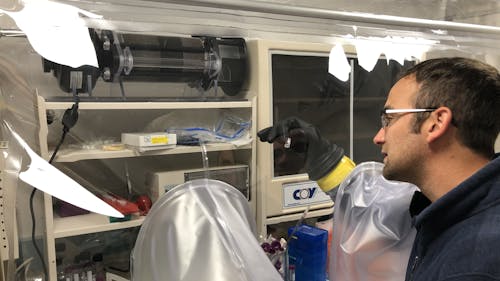Rutgers researchers study origins of early life

Postdoctoral researchers Joshua Mancini and Saroj Poudel, along with biophysics doctoral candidate Douglas Pike, are seeking to demonstrate the manner in which life could have evolved under the conditions of the early Earth through their research at Rutgers.
The early Earth would have had rocks, water and amino acids from meteorites that crashed into its surface, among other things, Pike said. As a result, the research primarily consists of catalyzing reactions between small proteins, which are composed of amino acids, and metals in an attempt to initiate life.
Before catalyzing these reactions in a lab setting, a computer model of the protein has to be developed. Once this is done, the model of the protein can be synthesized with an instrument in the lab, which creates the protein in the form of a powdery substance.
“We do computational modeling of the proteins and how they coordinate with metals, and then we go to the lab and we use an instrument that synthesizes the amino acid sequence into a small protein to get an actual chemical powder that is the protein,” Pike said. “And then we literally mix the peptide with metals and look for reactivity of different kinds.”
”One of the things we are focused on right now is whether these peptide metal complexes can produce hydrogen gas,” Pike said.
The importance of the research is due to its ability to determine the conditions under which life originated, Poudel said. This information could also be used to help scientists who are looking for life on other planets.
“The goal of this project is to discover: Why do we even exist, and how did we emerge? We are focusing on Earth itself because we’re trying to understand what could be the environment that might have led to the emergence of different types of organisms,” Poudel said. “We just want to see what type of early Earth environment could have been created so that life could have emerged.”
The research has been progressing for about a year at the Center for Advanced Biotechnology and Medicine on Busch campus and the Department of Marine and Coastal Sciences on Cook campus, Mancini said.
The impetus for the project came in the form of a proposal by the Evolution of Nanomachines in Geospheres and Microbial Ancestors (ENIGMA) research team in 2018, Poudel said. The ENIGMA team is funded by NASA and “is focused on answering a single compelling question in astrobiology: How did proteins evolve to become the predominant catalysts of life on Earth?” according to its website.
The ENIGMA team consists of many Rutgers professors alongside researchers from other institutions across the country. Mancini, Pike and Poudel conduct their research as a part of the team.
“NASA funds the project that tries to understand different early Earth-type environments, they want to understand how life might have emerged on early Earth," Poudel said. “The team at Rutgers and other institutions came together and put together a proposal in 2018, and my research for my Ph.D. was similar to this.”



